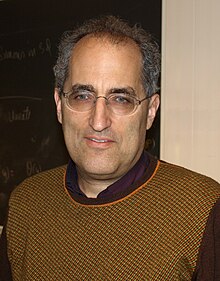Edward Witten (born August 26, 1951) is an American theoretical physicist known for his contributions to string theory, topological quantum field theory, and various areas of mathematics. He is a professor emeritus in the school of natural sciences at the Institute for Advanced Study in Princeton.[4] Witten is a researcher in string theory, quantum gravity, supersymmetric quantum field theories, and other areas of mathematical physics. Witten's work has also significantly impacted pure mathematics.[5] In 1990, he became the first physicist to be awarded a Fields Medal by the International Mathematical Union, for his mathematical insights in physics, such as his 1981 proof of the positive energy theorem in general relativity, and his interpretation of the Jones invariants of knots as Feynman integrals.[6] He is considered the practical founder of M-theory.[7]
- ^ "Announcement of 2016 Winners". World Cultural Council. June 6, 2016. Archived from the original on June 7, 2016. Retrieved June 6, 2016.
- ^ Woit, Peter (2006). Not Even Wrong: The Failure of String Theory and the Search for Unity in Physical Law. New York: Basic Books. p. 105. ISBN 0-465-09275-6.
- ^ a b "Edward Witten – Adventures in physics and math (Kyoto Prize lecture 2014)" (PDF). Archived from the original (PDF) on August 23, 2016. Retrieved October 30, 2016.
- ^ "Edward Witten". Institute for Advanced Study. December 9, 2019. Retrieved July 14, 2022.
- ^ Atiyah, Michael (1990). "On the Work of Edward Witten" (PDF). Proceedings of the International Congress of Mathematicians. pp. 31–35. Archived from the original (PDF) on March 1, 2017.
- ^ Michael Atiyah. "On the Work of Edward Witten" (PDF). Mathunion.org. Archived from the original (PDF) on March 1, 2017. Retrieved March 31, 2017.
- ^ Duff 1998, p. 65
